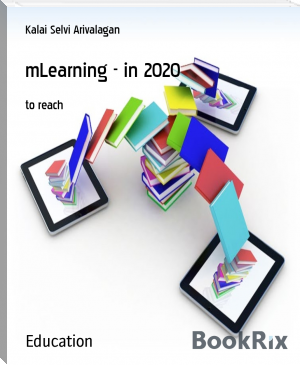INNOVATIONS IN SCIENCE, TECHNOLOGY AND MATHEMATICS EDUCATION IN NIGERIA - Ebele C. Okigbo, Nneka R. Nnorom, Ernest O. Onwukwe (best novel books to read TXT) 📗

- Author: Ebele C. Okigbo, Nneka R. Nnorom, Ernest O. Onwukwe
Book online «INNOVATIONS IN SCIENCE, TECHNOLOGY AND MATHEMATICS EDUCATION IN NIGERIA - Ebele C. Okigbo, Nneka R. Nnorom, Ernest O. Onwukwe (best novel books to read TXT) 📗». Author Ebele C. Okigbo, Nneka R. Nnorom, Ernest O. Onwukwe
In distance learning, the teacher is no longer the sole source of knowledge but instead he becomes a facilitator to support students learning. Distance education frees the learner from the constraints of time and space. It enables the leaner to pursue a degree from the comfort of his/her home. This form of education is very convenient for professionals and working class women who desire to enroll for higher education to enhance their career prospects and promotion. According to Hannay an Newvine (2006), distance learning has provided opportunity for a wide range of people who due to such factors as employment, marital status, family responsibilities and distance would not have been able to access formal education. Consequently, a large number of women and men who desire to possess a Bachelors degree or a Masters degree in Nigeria have enrolled in the various programmes of NOUN.
At NOUN, education is made accessible to all through a flexible and affordable distance learning mode. An undergraduate student of the university will be required to spend a minimum of four (4) years and a maximum of eight (8) years to graduate and obtain a certificate. To qualify for graduation, a student must,
Possess the entry requirements
Pay all the relevant fees
Register and pass all the compulsory courses and some electives courses
Pass the three computer marked assignments (CMA) attached to each course
Take part in the practicals/practicum/seminar/industrial attachment-where it is applicable
Write and submit a project/ thesis
Accumulate the stipulated grade point average (GPA) required for graduation in the programme
NOUN held its first graduation ceremony in January 2011 for over 8,000 students. Since then it has continued to graduate students on a yearly basis. A total of 7,000 students were awarded degrees, diploma and certificates in 2012, another 7,220 students in 2013 and over 7,000 in 2014 (NOUN Profile, 2015/2016). In 2019 the University graduated 20,799 students (NOUN News, March 2019). The large number of students graduating from NOUN indicates that open and distance learning in Nigeria has become fully accepted as a viable means of supporting the attainment of academic, social and economic development. However, some students have not been able to graduate from NOUN. Available records indicate that a significant number of students who enrolled in the university between 2004-2014 are still students of the university. They have not met the requirements for graduation even after spending over 8-11 years in the university. Why have they been unable to graduate? What could be the reasons for the delay in their graduation?
Literature review
A review of literature revealed the following as some of the likely reasons why students’ graduation could be delayed in open and distance learning.
Student Support Services: Student support services are an essential and integral component of open and distance learning. It consists of all the services provided for the students to enable them overcome learning barriers and complete their studies successfully (Gatsha & Evans 2010). According to Sharma (2002), student support services guide the student for self study and serve as an interface between the institution and the student. Simpson (2003) identified the following as activities that constitute student support services –orientation, seminar, group tutorial, assignment feedback, examination feedback, radio broadcast and individualized help by tutors, weekend tutorials, study skills and motivational seminars. He defined student services as all the activities beyond the production and delivery of course materials that assist students in the progress of their studies. Therefore student support services contribute to the quality of the students’ learning experiences and to their educational achievement. They are indispensable in the delivery of open and distance learning because of the peculiar characteristics of the distance learner. (Mirja & Singh, 2014) The provision of support services facilitates communication between students, academic staff as well as the administration. (Hillman, Willis & Gunawardena 1994, Kumar & Fozdar 2009). Student support services motivate students to continue their education and encourage socialization, teamwork, team spirit and improve the educational standards of the students ( Nnaka, 2014, Sherma, 2002 ). Student support services can be grouped into three categories – Academic, Administrative and Information services (Simpson, 2003). Timely notification of result is one of the academic support services in open and distance learning that is very critical to students’ success.
Demands of Employment: Students’ employment affects their success and time of graduation in open and distance learning (Tait, 2015). Working a large number of hours (20hrs+) can be detrimental to students’ success. Many distance learners are employed and are therefore part-time learners with multiples roles. Some spend between 30-40 hours a week on their jobs and rarely find time to study. Time conflict is a problem that distances learners in organizations face, and it is a major factor that affects distance learning from registration of courses to examination. Furr & Elling (2000), and Canabal (1998) in their various studies found that academic achievement of students can be affected by their working patterns. Hence the type of job a student holds has an impact on his academic success. Ford & Bosworth (1995) also found that the negative consequences of employment on academic studies include – reduced time to study, missed assignments, missed examinations, missed tutorials etc. Distance learning students who are employed also face the challenges of balancing their academic achievements, extracurricular activities and employment responsibilities (Furr & Elling 2000).
Family/Personal:Research studies have shown that majority of the women who enroll as distance learners are married (Nnaka 2013, Taplin 2000).This implies that most of the women still fulfill their commitments as housewives and mothers while carrying out their studies. Kramarae (2003) found that women often felt burdened by taking care of children and other family members at the same time as working and continuing their education. Prummer (2000) noted the apparent incompatibility of family and domestic responsibilities with serious distance education. The distance learner struggles with family obligations and increasing professional responsibilities, thus balancing school and family life can be a challenge. Family responsibilities exert a large influence on how well students perform in school and also determine how long they will take to graduate. Likewise personal problems such as ill-health and pregnancy could also prolong student’s expected date of graduation.
Financial Problems: Financial burden has been identified as one of the main reasons associated with students’ prolonged studies and delayed graduation. Evidence abound to show that some distance learning students experience problems of balancing needs of dependent relatives with payment of their tuition fees (Chaloux ,2008; Heller & Call ender, 2013). For many students access to financial aid even in small doses can make a difference in whether they can complete their studies and how long they will spend in the university. In a bid to overcome financial barriers to distance learning, many developed countries have set up financial aid, grants and scholarship schemes to assist students complete their studies.
Purpose of the Study
This study is aimed at finding out students’ perceptions on some of the reasons that delay their graduation in National Open University of Nigeria.
Objectives of the Study
The objective of the study was to identify from the students’ perspective the relative importance of the following reasons for students’ prolonged studies at NOUN:-
Demands of employment,
Family/Personal problems,
Financial problems,
Missing/omitted results,
Delay in approval of project topics and
Deficiency in entry requirement.
Research Questions
Based on the background and literature review and to address the purpose of the study, the following research questions were formulated.
1. What are the perceptions of students on the main reasons for their delayed graduation in NOUN?
2. What are the students’ expectations from the University?
Methodology
This study is a qualitative case study design. Qualitative studies are known for their ability to understand phenomenon from the participant’s point of view. (Bogdan & Briklen, 1998). The study sought to find out the reasons why some students’ graduation is delayed from the point of view of the students themselves. The study was carried out in one of the study centres of National Open University of Nigeria. The centre was selected because it seems to have experienced a decline in students’ graduation rate. Moreover the centre was one of the pioneer study centres that admitted the first set of students of the university in 2004. A semi-structured interview guide which gave room for probing questions to be asked was used. The interviews were audio recorded with the permission of the participants. These were transcribed from audio to text and used for the analysis. To guide against bias and avoid influence on the data, the participants were urged to be honest and objective as much as possible. The interviewer also comported herself to stay disinterested in the responses given by the participants. These measures contributed to the validity of the data collected. Furthermore, the careful sampling of the participants, using audio-recorder to record, store and retrieve the data ensured internal and content validity.
Population and Sampling
The population was made up of 250 students who enrolled in the university from 2004 to 2014 for their first degrees but have not graduated from the university. The population excluded those students who have not taken all the prescribed examinations and assignments for their programmes. A purposive sample of 25 male and 25 female students participated in the study.
Data Collection
Focus group interview was used to collect data from the participants. The participants were interviewed in groups of five. Ten groups of students were interviewed over a period of five weeks. The interview was audio-recorded and later transcribed.
Data Analysis
The data were analyzed through content analysis. The interview responses were coded and categorized into themes.
Findings of the Study
Research Question 1: What are the perceptions of students on the main reasons for their delayed graduation in NOUN?
The participants highlighted the following as the main reasons for the delay in their graduation:-
Missing/omitted examination results, demands of employment, delay in approval of project topics, family/personal problems, financial problems and deficiency in entry requirement.
This is represented in Figure 1.
Figure 1: Graphic Representation of Responses on Reasons for Delayed Graduation
Missing /Omitted Result: 70% of the participants responded that the reason for the delay in their graduation was due to missing/omitted examination results. When a student does not find a score/grade for an examination he has taken, it is referred to as a missing result. Some participants direct quotations about missing results are stated below:-
“I have not seen the result of ESM407 that I wrote in October 2015. I am a final year student that suppose to” convocate” January 2018, but my name did not come out, due to the missing result”
“I don’t think I can graduate this year again with six of my results still missing in the School of Law. The issue affects many of us and we don’t know what to do “
“I sat for eight examination papers in March 2016, but three results are missing – MGS307, SMS306 and SMS308”
“I am already re-sitting the two courses –CSS 343 & CSS 356, whose results I did not see. I know I will pay more money, but it appears I don’t have any other option, with the way, the issue is going.”
“I am waiting for my result in NSS509 and NSS507; I have submitted my project since 2017, I have also written a letter of complaint to the Dean through the Centre Director”.
Employment Demands:
About 50% of the participants responded that the demand of their job was the main reason why they were still studying in National Open University of Nigeria (NOUN). Two students commented as follows about their jobs and





Comments (0)